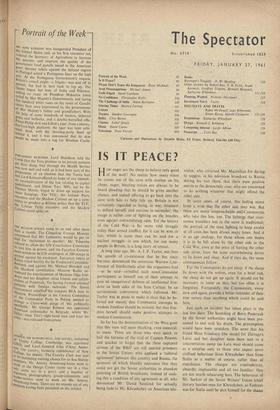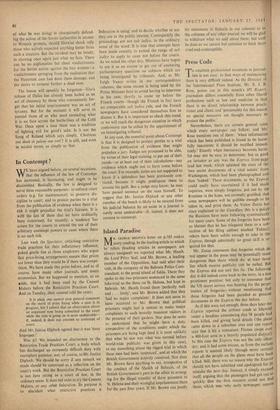IS IT PEACE?
How eager are the sheep to believe only good of the wolf! No matter how many times he comes out of the cave with mutton on his chops, eager, bleating voices are always to be heard pleading that he should be given another chance, and indeed offering to go back into the cave with him to help tidy up. Britain is not commonly regarded as being, in war, reluctant to defend herself, and anxious to surrender; the image is rather one of fighting on the beaches even against overwhelming odds. Yet the history of the Cold War--a far more vital struggle today than armed conflict, for it can be won or lost, which is more than can be said for a nuclear struggle—is one which, for too many people in Britain, is a long story of retreat.
A long time ago, Mr. A. J. P. Taylor, not then the apostle of co-existence that he has since become, denounced the notorious Warsaw Con- ference of Intellectuals after the organisers had —as he said—swindled such non,COmmunist participants as himself out of their attempt to pass an unequivocal defence of intellectual free- dom. on both sides of the Iron Curtain. In an acrimonious controversy which followed, Mr. Taylor was at pains to make it clear that he be- lieved not merely that Communist attempts to weaken freedom should be resisted, but that free- dom herself should make positive attempts to weaken Communism.
So far has the demoralisation of the West gone that this view will seem shocking, even immoral,
to many. There are those who were quick to hail the fairness of the trial of Captain Powers, and quicker to forget that the three captured airmen of the RB47 are still untried prisoners in the Soviet Union; who applaud a 'cultural agreement' between this country and Russia, the sponsors of which blandly announce that they could not get the Soviet authorities to abandon jamming of British broadcasts, instead of mak- ing this a condition of any agreement at all; who denounced Mr. David Susskind for actually being rude to Mr. Khrushchev on American tele- vision; who criticised Mr. Macmillan for daring to suggest, in his television broadcast to Russia during his visit there, that there were positive merits in the democratic case; who are concerned to do nothing whatever that might offend the other side.
In some cases, of course, this feeling sterns from a wish that the other side may win. But there are many irreproachable anti-Communists who take this line, too. The lethargy that over- comes travellers lost in the snow is traditional; the portrait of the man fighting to keep awake at all costs,•has been drawn many times. And it is an apt analogy, for those whose one desire it is to be left alone by the other side in the Cold War, even at the price of leaving the other side alone, have the same overwhelming desire to lie down and sleep. And if they do, the same consequences follow.
For the Communists do not sleep; if the sheep lie down with the wolves, even 'for a brief rest, the sheep do not get up again. It should not be necessary to insist on this; but too often it is , forgotten. Fortunately, the Communists, every now and again, provide a better reminder of their true nature than anything which could be said here.
Just such an incident has taken place in the last few days. The hounding of Boris Pasternak by the Soviet authorities might have been pre- sumed to end with his death. The presumption would have been mistaken. The news that his friend Mmc lvinskaya (the model for Zhivago's Lara) and her daughter have been sent to a concentration camp (as Lara was) should come as a surprise only to those who expect more civilised behaviour from Khrushchev than from
Stalin as a matter of course, rather than of expedience. The charges are contradictory, absurdly implausible and all too familiar; they are not worth rehearsing here. The behaviour of Mr. Surkov of the Soviet Writers' Union (chief literary hatchet-man for Khrushchev, as Fadeyev was for Stalin until he shot himself for the shame
of what be was doing) in obsequiously defend- ing the action of the Soviet authorities in answer to Western protests, should likewise shock only those who naïvely expected anything better from such a creature. But the incident may be timely, in showing once again just what we face. There can be no explanation but sheer vindictiveness for the Soviet action against the two women—a vindictiveness springing from the realisation that the Pasternak case had done them damage, and the desire to torment further a dead man.
The lesson will speedily be forgotten—Tito's release of Djilas has already been hailed as an act of clemency by those who conveniently for- get that his initial imprisonment was an act of tyranny. But for the moment it will serve to remind those of us who need reminding what it is we face across the battle-lines of the Cold War. Once upon a time there was a tradition of fighting evil for good's sake. Is it not the Song of Roland which says simply, 'Chretiens ont droit et paiens ont tort'? It is still, and even in secular terms, as simple as that.











































 Previous page
Previous page